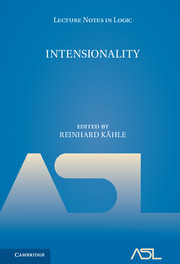Book contents
- Frontmatter
- Preface
- Contents
- The modal aether
- Possible worlds semantics for predicates
- A context principle
- The semantics of modal predicate logic II. Modal individuals revisited
- Intensionality and coercion
- Intensionality in philosophy andmetamathematics
- Representation theorem for models of dynamic intensional logic
- Intension, intention
- Modality, mood, and descriptions
- Coercion vs. indeterminacy in opaque verbs
- References
Modality, mood, and descriptions
Published online by Cambridge University Press: 30 March 2017
- Frontmatter
- Preface
- Contents
- The modal aether
- Possible worlds semantics for predicates
- A context principle
- The semantics of modal predicate logic II. Modal individuals revisited
- Intensionality and coercion
- Intensionality in philosophy andmetamathematics
- Representation theorem for models of dynamic intensional logic
- Intension, intention
- Modality, mood, and descriptions
- Coercion vs. indeterminacy in opaque verbs
- References
Summary
Abstract. In this paper, I argue that Kripke's modal argument against description theories of proper names is fallacious. More precisely, it is shown that the argument crucially depends on a failure to distinguish between the subjunctive and indicative moods of English. I propose a formal system in which such a distinction is implemented in a straightforward way, and show that Kripke's argument is invalid when formalized in this setting. The formal language introduced is compared to modal predicate logic with and without an actuality operator and to a standard first-order language with explicit quantification over possible worlds.
Introduction. By means of what semantic features is a proper name tied to its bearer? This is a puzzling question indeed: proper names — like “Aristotle” or “Paris” — are syntactically simple, and it therefore does not seem possible to reduce theirmeanings, bymeans of a principle of compositionality, to the meanings of more basic, and hence perhaps more tractable, linguistic elements.
It used to be widely held that the syntactical simplicity of proper names is misleading, that names are just abbreviations, in some sense or other, for certain other expressions, whose referential mechanism is clearer. The most prominent such theory, sometimes attributed to Frege and Russell, holds that the expressions for which proper names go proxy are definite descriptions, like “the man who taught Alexander the Great” or “the capital of France”. While not without problems of its own, this description theory of names has a great intuitive appeal, and yields a beautifully unified account of the phenomenon of singular reference.
Thirty years ago, however, an influential argument against the description theorywas put forward by SaulKripke. Appealing to the referential behaviour of names and descriptions, respectively, in contexts of metaphysical possibility and necessity, it has come to be known as the “modal argument”. According to Kripke, names are “rigid designators”, referring to the same individual no matter what actual or counterfactual situation we may be speaking about, whereas definite descriptions usually designate, if at all, non-rigidly, shifting their referents from possible world to possible world.
- Type
- Chapter
- Information
- Intensionality , pp. 187 - 216Publisher: Cambridge University PressPrint publication year: 2005
References
- 2
- Cited by

